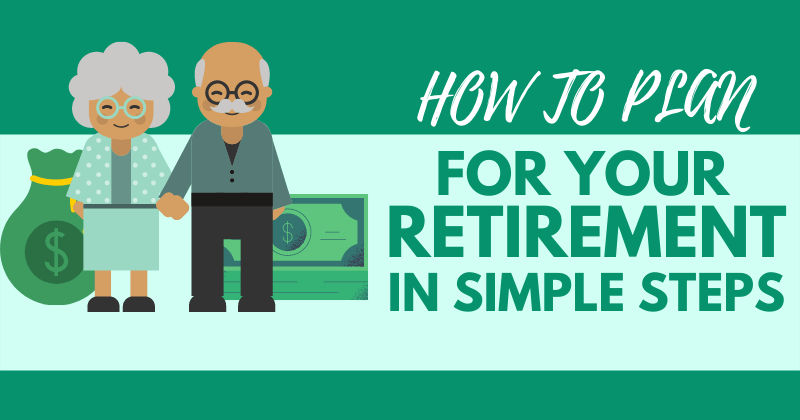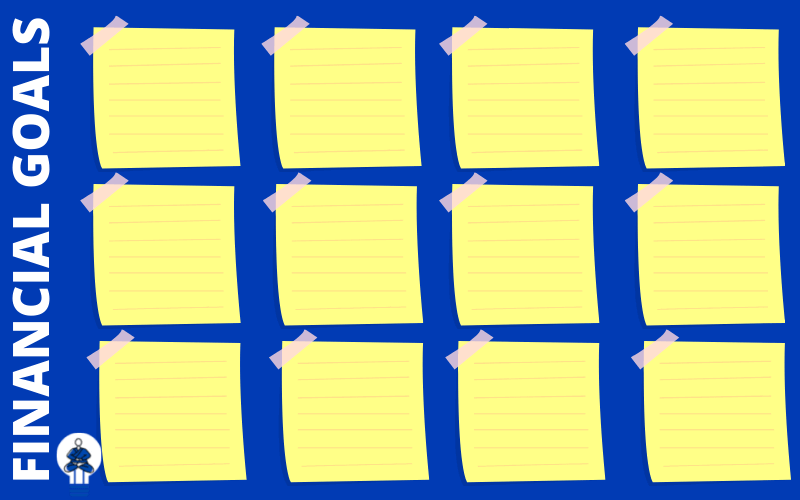The Only Retirement Planning Guide You’ll Ever Need

This article may contain affiliate links. If you make a purchase using my links, I’ll earn a small commission at no extra cost to you. I appreciate your support!
Are you Afraid of Retirement Planning? Do you wonder if you’ll have enough money when you retire?
Follow along as I’ll show you in 8 practical Steps how you can prepare for retirement. I’ll also give you 11 Tips for early retirement.
Retirement planning for you may be spending more time with friends and family, for someone it might be traveling the world whereas for someone it’s shifting from your full-time job to a part-time job.
Figuring out what it is you want will force you to achieve those goals. Retiring early isn’t difficult, we make it difficult. So keeping that in mind, let’s get started!
8 Steps To Prepare For Your Retirement
Step 1: Visualize Your Retirement Dreams

How do you want to spend your retirement? If you haven’t thought of it yet, think of it now.
The goals, parties, and vacations you plan to do after your retirement fall under the imagination category.
Did you always want to visit Argentina but didn’t get the time due to office work? Want to plan a long 6-month trip to your daughter’s house?
Now is the best time to do those things but now seems impossible, doing it in your retirement is awesome! Plan to stay with 3 of your best friends, it ain’t a bad idea!
Is a nice farmhouse near a lake a must? Write it down! Doing this will help you set goals that will make your goals more attainable.
Be as specific as you can but if it’s too vague (like visiting new countries), that’ll do. Just get a few initial ideas of what you’re planning to do in your retirement.
Write as many dreams, goals, wants, and needs as you wish to write. Don’t stop at 5, 6, or 10 items. Check out this article if you want 200+ bucket list ideas for your retirement.
Whether you’re in your 20s, 30s, or 70s, saving money is essential, and so is spending money. Learn to balance both to have a happy and satisfying life.
Step 2: Money In The Bank
I’m sure you know how much money you bring home. Then you’ll also know how much you save and spend.
Now that you have your goals and dreams on a piece of paper, find out exactly how much money you have in the Bank.
This includes all investment assets you have like stocks, bonds, government securities, gold, commodities, etc.
Do you have a retirement account? How much money have you saved on it? You need to understand one fact – saving money today means you have more money tomorrow aka money for your future!
Step 3: List And Cut Expenses
See even if you make more money than 95% of individuals, if you have a bad habit of saving money, you’ll never be rich and financially free!
Learning to save is super important so I suggest you get started with making savings a habit.
- The first step is to create a budget, if you don’t have a budgeting worksheet, I’ve made a free Budget worksheet that will surely help you to get your finances in check.
- Then list down all expenses and income sources, analyze each expense, and see all unnecessary expenses, then cut those off and never spend money on it.
- Don’t fall into impulsive buying as that’s the biggest money trap.
Follow this simple budgeting strategy and you’ll easily be able to save money and cut expenses.
Step 4: Create A Health Insurance Policy

The older you get, the more health risks you’ll have. So a health insurance policy is essential for your safety.
You have to be as healthy as possible, that can only happen if you eat healthy, exercise, and sleep well.
A health insurance policy will help you when things turn upside down, it’s an easy way to safeguard yourself and your family.
Medical costs are too much nowadays, so to combat these heavy expenses, it’s best if you have an insurance policy in place.
Step 5: Invest In Employee Funds
401(K), IRA, EPF, PF, or whatever they call it in your country is an employee fund that is beneficial for you during your retirement. Make sure you max out your employer’s match.
This means if the maximum amount your employer can invest in EPF or 401(K) is 20% of your income, you better match that no matter what!
Many suggest that such funds are useless as they park your money till your retirement, while that’s true they also provide you with an opportunity to double your money with zero risks involved.
If you put 20% of your income in a 401(K) plan, your employer will also contribute 20% of your income in your 401(K) plan (out of his pockets!!!).
I hope you realize that you’ve just doubled 20% of your money in no time with Zero Risk involved. This money will make your retirement life easier.
Step 6: Explore Post-Retirement Opportunities

It’s not the end! Retirement is a new beginning, to do a new thing and make money off that. So what if you’re retired from your job, you can be a consultant, a sales representative, or a real estate broker.
Your skills and hobbies can be beneficial to you during retirement. These skills will help you make money and not live frugally.
Of course, you ought to have a retirement account and enough saved up for your retirement but having a source of income after your retirement means you literally can be stress-free about financial problems.
Many sales representatives work for different companies as consultants once they are retired from their company.
There is no restriction on the age of consultants, plus if you’re old, companies pay more cause knowledge comes from experience! Consulting will surely help you make good money in your 60s and beyond!
Step 7: Establish An Emergency Fund
This goes without saying, an emergency fund is probably the most useful thing you’ll ever need but hope that you’ll never need it!
An emergency fund is a stack of money you keep aside, preferably in another savings account.
Two rules to follow:
- Never touch your emergency fund money unless it’s an emergency
- Keep at least 3 months of expenses and increase 10-20% of your fund money each year.
Your emergency fund must be used when you’re fired from your job, when you have a medical emergency, or when you have to pay off debt.
Don’t use your emergency fund for all expenses, keep it in a savings account and ensure it’s highly liquid. Then when you need it you have it!
Step 8: Crunch the Numbers
The last step to a successful retirement plan is doing the math. How much money do you need for your retirement, considering all your goals and dreams you’ve listed in Step 1?
If you only have 10% of the money you seem to need for retirement, how are you going to strategically work your way toward accumulating 100% of your assumed money in the bank?
Once you know you need 90% more in the next X years, break down numbers, first, how much you need to make each year, add additional income sources (2-3 side hustles), learn to save and be frugal, calculate exactly how fast can you get out of debt, do the math and constantly keep checking to see if you’re improving and touching your monthly, yearly financial goals for your retirement.
11 Quick & Easy Tips To Boost Your Retirement Early Journey
1. Invest In Low-Risk Stocks
Investing in stocks is an easy way to grow your money while you sleep. Investing in stocks has proved to be one of the best investments, but that doesn’t mean you invest all your money in one basket.
You’ve probably heard of Warren Buffett, then I’m assuming you’ve heard of Warren Buffett focusing on Diversification as a key strategy to get good positive returns on your investments.
Here’s an article that will help you to diversify your portfolio.
Read More >>> 14 Simple Ways To Invest With Little Money
If you’re young, taking on risks seems like a viable option but I recommend you focus on long-term investing specifically low-risk stocks, why?
Because these stocks will give you consistent returns and market volatility hardly affects their growth.
The thumb rule is anything related to retirement, Play It Safe, avoid risks, and minimize losses.
2. Minimize Vehicle Expenses

If you think cars are cheap, Think Again! Cars usually cost 30-50% of your annual take-home income.
Are you willing to spend so much money on a vehicle? That’s not it, on top of paying the cost of the car, you’ll also be paying for regular maintenance, pay for broken parts, and a monthly clean-up.
Adding all these costs can be a huge chunk of your salary, do you want to waste so much money on a vehicle that only takes you from Point A to Point B?
Use your old vehicle, get it repaired if it’s not working smoothly, and use it as long as you can. Then use public transportation to travel.
A car is a luxury, it’s a rich man’s lifestyle, if you’re trying to save money and you restrict spending a few dollars on food and clothes, then why are you letting yourself spend so much on a vehicle?
3. Consider Investing In Gold
Gold isn’t the best investment out there but it sure is a beautiful investment. In India, it’s a tradition to give gold.
You might think gold isn’t that lucrative and its returns won’t make you rich, you’re right, gold won’t make you rich but it will bring happiness in your life, it will secure your financial future and you feel rich.
What I’ve observed is that gold is an emotional investment, investment and emotions don’t go together but gold has proved to provide good returns year over year. Invest a small portion of your money in gold.
4. Develop Cooking Skills

Do you love to eat food? Wrong Questions! Do you love to eat delicious scrumptious food?
Who doesn’t, if you don’t like the food please skip this point. The major problem with home-cooked food is, ‘It’s Not That Tasty’.
That’s why most people prefer going to restaurants and spending a lot of money to eat delicious meals that will satisfy their palates.
Eating once or twice a month may not cause a huge financial problem, but binging on outside food items now and then will surely make big holes in your pockets.
To avoid this, simply learn to cook like a chef, and then you’ll rarely feel like going on dinners or grabbing that everyday pizza slice on the way to work.
YouTube is your beginner’s guide to learning Cooking. Once you’ve browsed and practiced a bunch of recipes on YouTube, find paid courses (online or offline) to learn professional cooking skills and recipes.
I’m not suggesting you restrict eating outdoors, once a month is fine but don’t overdo it.
5. Strategically Reduce Your Debt
If you’ve taken the courage to bring debt into your life, take the courage to throw it out of your life. You can’t live happily with debt on your shoulders, you’re constantly thinking about your debt payments.
So starting today, make a strategy to avoid debt, as far as I know, the more money you make the more you can give towards debt.
For that, start a business or work part-time after your work hours. Choose one of the two debt-paying-off strategies – Debt Snowball and Debt Avalanche.
Don’t spend money if not necessary and reduce investing, instead focus on paying off debt!
6. Start A Business
Let’s say you make 50,000 from your day job, you save 5,000 in your retirement account and the rest goes towards savings, investments, expenses, payments, and so on.
Now you’ve started a business and you’re making 10,000. Assuming you don’t spend more money and keep all your expenses the same, you will now have 10,000 extra to put towards investments and retirement funds.
7. Network With People Of Your Age
You need to build your network even after your retirement. It’s an easy way to get work and make money to fund your retirement goals.
Plus knowing more people means you can talk to more people, enjoy with them, and also make money with them.
Many people in their retirement start a business with fellow people they meet during networking seminars. Start with 10 minutes a day on LinkedIn, and 10 min on Facebook.
Ask them how you can add value to their business. The more good relations you create, the more opportunities you create for yourself, which means more fun during retirement!
8. Don’t Depend On Anyone For Financial Assistance
You’ve born and brought up your child in this world, that’s a great thing you’ve done. But that doesn’t mean you can depend on them after your retirement.
Don’t get me wrong, it’s their responsibility to take care of you before and after your retirement but don’t depend on that fact.
Be financially stable and spend your own money. If they help you accept it but don’t be in a position to beg them to pay you all the time.
Don’t force them to pay for your luxuries. If you need medical assistance, I’m sure they’ll help you but don’t blindly rely on them.
Here’s a video by Dave Ramsey on Families forcing their daughters for money.
9. Systemically Budget
If you know how much comes in and out of your bank, your retirement journey will be extremely easy.
I’m serious, just by having a few sheets of paper, you can make sure you won’t have financial problems.
If you’re confused about how to budget, you can follow the 50-30-20 Budget Rule. I find this rule to be so easy yet so effective, most people I know follow this when their financial journey is a mess.
10. Set A Time Limit
How old are you right now? How many years do you have till you retire? The more important question is – When do you want to retire?
You may want to retire at 40 or 50, get that number in your mind. This will help you to calculate how much you need to save and make each year to store X amount for your retirement.
Maybe you have 20 years till retirement, 3 years till you get a new job, 2 years to start a new business, 5 years to double your investments, and 10 years to save 5(X) your annual salary.
Got it? Set a time limit and make calculations to ease your retirement problems.
11. Make Financial Goals

I want to make 50,000 in a year through my new business. I want to save 10,000 and invest it in the forex market.
I want to learn real estate and invest in properties to make money. Write such financial goals. They will further boost your fast retirement journey.
What Is Financial Independence Retire Early (FIRE)?
Financial Independence Retire Early (FIRE) is a method to aggressively save and invest your money in hopes of reaching early retirement and breaking the traditional norm of retiring in your 60s.
If you adapt to the FIRE lifestyle, you can retire early, as early as in your 30s!
The two basic principles to follow when on Financial Independence Retire Early are increasing your income and cutting expenses to the core.
FIRE is all about maintaining focus and having a goal-oriented mindset. If you want to achieve early retirement, then FIRE might suit your needs, but it does come at a cost – you won’t be able to spend on anything irrelevant.
Only basic needs like food shelter, basic clothing, nothing else.
But don’t only focus on saving, you should equally work on creating new sources of income, like a part-time job, a business, freelancing, or something else that generates you income.
The more money you have in the bank, the faster you can retire.
If that is something you believe you can adjust to, retiring early is a possibility you can achieve soon, I’m certain of that!
Is Early Retirement Possible?
Retirement isn’t an age, it’s the time when you are financially stable, the time when you don’t need to depend on others for money and other financial assistance.
Our jobs define retirement as age, so we need to make sure we’re equipped with the knowledge and good money habits to make, save, and invest money. That way when retirement hits us, it won’t create problems.
Investing for retirement is a habit, don’t make it a forceful habit cause then it won’t work for the long term.
If you think this is too much to do and you need to simplify the financial aspects of retiring, consider talking to a financial expert.
They’ll look through your financials and guide you with a proper plan to tackle hurdles and have enough money for your retirement.
Here are Three Quick Retirement Savings Calculators That’ll give you an estimate of how much you need to retire:
- Retirement Planning Calculator By Cleartax (India)
- Retirement Calculator By Bankrate (Dollars)
- Dave Ramsey Investment Calculator
Have you started planning for your retirement? Do you want early retirement? Let me know in the comments below!
Have you enjoyed this post? If so, you might want to subscribe to my newsletter. It usually contains life lessons and money-related topics, some interesting observations, links to articles or books I’ve read, and tips to be a better person. If you’re interested in these things then subscribing will be simply wonderful 🙂 PS: Subscribe and Get your Freebie below!
Also, I’m a YouTuber now! If you’re interested in Pinterest Marketing, Blogging, or business-related things, Subscribe to my Channel and I’ll see you in the comments!